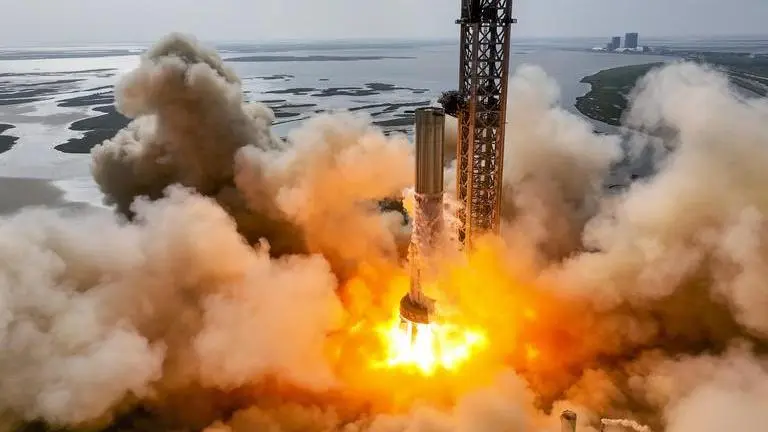Updated 30 November 2022 at 16:47 IST
'Little more progress to Mars': Elon Musk after successful test fire of Starship booster
SpaceX completed a successful static test fire of the mega rocket’s Super Heavy booster at 1:12 am IST at its Starbase facility in Boca Chica, Texas.
- Science News
- 2 min read

SpaceX has made significant progress toward the first orbital launch of Starship. The Elon Musk-led company completed a successful static test fire of the mega rocket’s Super Heavy booster at 1:12 am IST at its Starbase facility in Boca Chica, Texas. During the test, 11 Raptor 2 engines of the Booster 7, the prototype of Starship's first stage, were ignited for a total of 13 seconds.
T-10 minute SIREN! https://t.co/zai4BvjIUZ pic.twitter.com/sbVviSh0A4
— Chris Bergin - NSF (@NASASpaceflight) November 29, 2022
"A little more progress to Mars," Musk tweeted confirming the success of the test fire. The Super Heavy booster is equipped with 33 Raptor 2 engines and SpaceX is conducting test fires with a limited number of engines owing to a recent incident when the booster caught fire. Following a minor explosion, Musk said that the Starship team will not conduct test fires with all engines at once. The reason for this is that each of these engines is capable of producing roughly 230 tons of peak thrust, making Starship the world's most powerful rocket to be ever built.
A little more progress to Mars https://t.co/TUjECUHaQ3
— Elon Musk (@elonmusk) November 29, 2022
Starship is basically composed of two components-- the Super Heavy Booster and the Ship-- and SpaceX will be using the Booster 7 and Ship 24 prototypes for the mega rocket's first orbital flight. This latest test was conducted two weeks after SpaceX fired 14 engines, the most to date, making Starship the world's most powerful active rocket. The test on November 15 saw the 14 Raptor 2 engines produce 3,220 tons or 7.1 million pounds of thrust making the booster alone surpass NASA's Space Launch System (SLS) rocket which did not lift off until November 16 for the Artemis 1 mission.
Meanwhile, SpaceX is preparing for Starship's first flight to orbit which is expected to take place in December, as was revealed by a NASA official. Mark Kirasich, deputy associate administrator for Artemis Program, had said during a conference late October that NASA is monitoring the four Starship launches first of which is likely in early December.
Advertisement
Published By : Harsh Vardhan
Published On: 30 November 2022 at 16:47 IST
